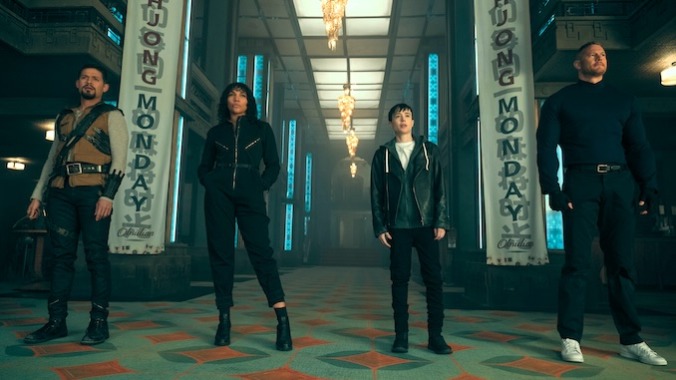The Umbrella Academy Ends With a Whimper in Confounding and Messy Final Season
Photo Courtesy of Netflix
You would think that a show obsessed with the apocalypse would end with a bang, but watching Season 4 of The Umbrella Academy, it’s clear that the end couldn’t come quick enough in this final, lackluster run that fails to do justice to everything that came before. Closing the doors on this academy for good is just a mercy to everyone involved at this point, and longtime fans, especially, who have stuck with these oddballs since the very beginning.
Five years have passed since the gang first won us over in the series’ premiere, but in the show itself, six years have now elapsed since Season 3 ended in a reset timeline where the Hargreeves family no longer have access to their powers. It’s the life most of them have always wanted, a chance to be normal, but when relics from the old world start bleeding into this one, the gang get caught up in what inevitably turns out to be another apocalypse.
There’s no problem with that, per se. It’s the Academy’s whole schtick, after all, and to the show’s credit, this apocalypse feels more personal than any they’ve faced before. The problem is that no one seems to care about it in the back half of this season’s run, including the team themselves.
The premiere starts off strong with a focus on bringing everyone back together and restoring their powers, regardless of whether they actually still want them or not. With that out of the way, our faves soon encounter a cult obsessed with a prophecy dubbed “The Cleansing,” which leads them to a strange town where nothing is quite what it seems. There, they meet a woman named Jennifer (Victoria Marie Sawal) who quickly forms a close bond with Ben (Justin H. Min) that also might not be what it seems. In fact, the secrets she holds are the key to everything, but how is their father, Reginald Hargreeves (Colm Feore), still caught up in all this?
It’s an intriguing set-up that sets season four apart from everything that’s come before, yet Viktor (Elliot Page) is the only one who’s actually concerned with trying to save reality. The others sort of lose interest halfway through and start to do their own thing instead. To be fair, the team have never pretended to be particularly good at what they do, and it’s easy to see why they’re a bit over fighting the apocalypse yet again, but why are we supposed to care if they don’t? Shouldn’t this be the one season where the stakes matter most?
Watching various team members split into nonsensical side stories turns out to be a bit cringe in ways Gerard Way’s original comic never was. The cast are as game as ever and do their best with the material, including new additions Nick Offerman and Megan Mullally as Gene and Jean Thibedeau. But even they, an undoubtable highlight of Season 4, don’t live up to expectation, as proved by their involvement in this season’s tired take on the surreal dance sequences that were once huge talking points for the show.
Luther (Tom Hopper) suffers more than most with embarrassing stripper scenes that highlight the inexplicable return of his gorilla body, but he’s not the only casualty of the writing this time around. Two episodes in, the entire family choke and gag their way through an extended vomit sequence set to “Baby Shark” that could have been lifted straight out of Family Guy. And that’s before we get into how Klaus (Robert Sheehan) is casually used as a vessel for ghost sex later on against his will.
That’s a particularly odd choice to make when the show effectively ignores his powers at other opportune times throughout the rest of the season. This has always been somewhat of an issue for The Umbrella Academy, but never more so than it is here. For example, Allison Hargreeves (Emmy Raver-Lampman), aka The Rumor (!!!), doesn’t spread a single rumor this time around. Instead, the writers have given her a power boost where rumors no longer need to be spoken out loud, which turns out to be a lazy, ball-busting approach in more ways than one.
-

-

-

-

-

-

-

-

-

-

-

-

-

-

-

-

-

-

-

-

-

-

-

-

-

-

-

-

-

-

-

-

-

-

-

-

-

-

-

-








































